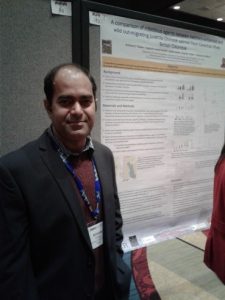The CERC Early Career Development Grant provided us with the opportunity to attend the Bioinformatics and Statistics Short-course for Shotgun Metagenomic Research by the Microbial Ecology Group of Colorado State University. The one-and-a-half day course was held as a pre-conference workshop in conjunction with the Conference of Research Workers in Animal Diseases (CRWAD) at the Chicago Marriot hotel, Chicago, Illinois, from December 2-3, 2017.
The first day of the course discussed the bioinformatics behind metagenomic high throughput sequencing data processing. This includes methods behind the AMR++ Nextflow metagenomic analysis pipeline, basics of navigation on the GN

Krishna presenting his poster at the Conference of Research Workers in Animal Diseases (CRWAD)
U/Linux command line, and Amazon Web Services for bioinformatics processing. Hands-on exercises, with running of the AMR++ Nextflow pipeline on a data set derived from real metagenomic sequencing data, was part of the course. The attendees generated the count matrix from running of the AMR++ Nextflow pipeline, which served as the input for statistical analysis of metagenomic data on day 2.
Day 2 was aimed at understanding how to proceed from the bioinformatics processing of data through statistical analysis of the count matrix. This involved different approaches to the statistical analyses of metagenomic and microbiome count data using a newly-developed graphical interface through the AMR++ Shiny App. This half-day section involved both lectures and practical exercises on installing/updating the AMR++ Shiny App, exploratory graphing of count matrices, regression modeling, and interpretation of statistical results with AMR++ Shiny App.
This course enabled us to familiarize ourselves with new dimensions of the genomic research, and appreciate the potential and challenges associated with the generation of big data from high throughput sequencing. It also introduced us to some of the available tools and methods to handle such data.
In addition, we attended the Schwabe Symposium, held on the afternoon of December 3. The theme for the symposium this year was “Novel methods and practical application of diagnostic tests,” Dr. Ian Gardner was honored with the prestigious Calvin W. Schwabe Award for lifetime achievement in veterinary epidemiology and preventive medicine. We also presented our posters at the CRWAD and attended some of the oral presentations during the conference.


